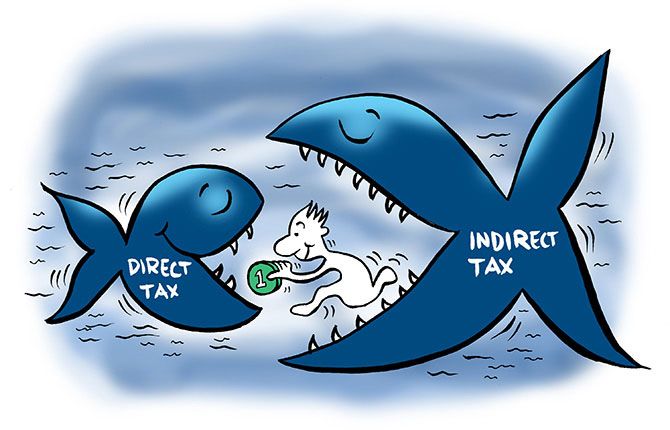- GST compliance will certainly push up cash flow requirement.
- Most experts feel GST rules have the potential to trigger legal dispute for taxpayers.
With the implementation of the goods and services tax less than 75 days away -- assuming July 1 as the roll-out date -- Sudipto Dey provides a guide to how businesses can navigate the transition.

Illustration: Uttam Ghosh/Rediff.com
What should businesses keep in mind while generating invoice?
Generating an invoice is perhaps the most critical part of the new indirect tax regime, based on which the input tax credit will be decided. According to the draft rules, invoices have to be filled up in a fairly detailed format.
The absence or wrong filing of required information could trigger denial or delay in claiming input tax credit.
Largely, there are around 16 particulars that are required to be filled up. These include various details of the supplier and the buyer such as the HSN (Harmonised System of Nomenclature) code, the 15-digit goods and services taxpayer identification number (GSTIN) of the recipient and the state code in which the delivery has been made.
"Service providers are required to give state-specific registration number while filing the invoice," said Pritam Mahure, a Pune-based chartered accountant and GST trainer.
For generating the invoice, the IT configuration in a business has to capture a variety of transactions, such as services on inter-company basis, stock transfer and receipt of advances and centralised procurements for re-distribution, noted Amit Sarkar, partner & head, indirect tax, BDO India.
What are the key dos and don'ts while claiming the input tax credit?
For claiming any input tax credit, all vendors in the supply chain have to be tax compliant.
There is also a plan to rate all taxpayers on their GST score card -- putting additional pressure on vendors to be GST-ready.
Under the current system, a supplier can claim tax credit from the government irrespective of whether the vendor has met his tax obligations. That is set to change in the GST regime.
"Vendor should pay tax before the same is claimed as input tax credit. The recipient must receive the tax invoice and supplies before claiming credit," said Rakesh Nangia, managing partner, Nangia & Co.
Given the credits can be availed of only within the specified time limit, the date of issuance of invoice becomes important. "Monitor the payment of value for the goods or services within the period of 180 days, while keeping a track of the debit or credit notes," advised Sarkar.
According to the draft rules, vendors should be paid within 180 days of claiming credit. "Credit should be claimed only for procurements related to taxable business supplies only," added Nangia.
How will the stock transfer of goods or services be different under the GST regime?
The model GST law puts the onus of determining whether a transaction is an "intra-state" or "inter-state" on the assessee.
"So, one needs to decide whether the payment is against the central GST (CGST) plus state GST (SGST) or integrated GST (IGST), based on the type of transaction," said Mahure.
Services being intangible in nature, there are proxy rules or provisions in the GST framework to help the assessee determine the place of consumption. To determine the place of supply in GST regime, it becomes important to have permanent address of the service recipient.
However, this can pose a challenge for sectors like telecom where customers keep moving from one state to another. "Telecom companies have to update their customer database on real-time basis, complicating their operations," said Mahure.
Tax experts note that under GST all inter-state stock transfers, including self-supplies, are chargeable to tax. Similarly, intra-state stock transfers between the different registered business verticals would attract GST.
"This also offers an opportunity for optimising the supply chain from a business perspective," said Sarkar.
According to the GST legislation, if an assessee wrongly pays, say CGST and SGST -- on the belief that the transaction is intra-state -- instead of IGST, they will have to pay the correct tax (that is, IGST) again and claim refund of the wrongfully paid taxes.
Several experts feel instead of putting the onus on the taxpayer to determine whether the transaction is intra-state or inter-state, the GST law should provide a simpler redressal mechanism.
Why one should provision for a higher cash flow requirement in the new system?
Levy of GST on inter-state stock transfers would be one of the many reasons which would push up the requirement of cash flows, said Nangia. For instance, a company transferring goods from one warehouse to another across different states will come under the ambit of IGST. This means taxes have to be paid upfront, increasing the cash requirement for the business.
Another reason for higher cash flow requirement for businesses would be the higher average rate of service tax under the GST regime.
Businesses currently pay around 15 per cent (including the various cesses) on services. This is likely to jump to 18 per cent in the GST regime.
Experts note exporters too would need to bear the brunt of the tax, before claiming rebate.
What are the likely challenges in determining the place of supply for services?
Service providers such as banks and insurance companies have to register separately in all the states in which they are providing services. This state-wise registration will substantially increase compliance costs of businesses.
Nangia notes the place of supply rules under the current regime of service tax are applicable only to cross border transactions.
"Going forward, similar rules would be applicable to every transaction whether domestic or international," he said.
Most experts feel the rules for the place of supply of services have the potential to trigger legal dispute for taxpayers.
Do you understand how GST will impact the Indian economy? Scroll down for a deeper insight.












 © 2025
© 2025